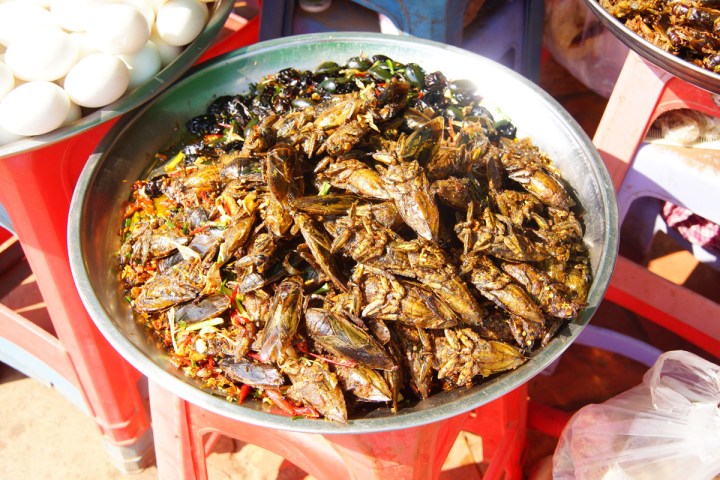
Speaking candidly to The Culinary Institute of America program director Nikki Briggs, William Rosenzweig (Dean of the Food Business School of The Culinary Institute of America), Ali Bouzari (author of Ingredient: Unveiling the Essential Elements of Food), and Mike Lee (founder of The Future Market and Studio Industries) talked crazy future food, advancements in food tech, and their favorite cooking gadgets. As expected, the answers ranged from realistic to far-fetched, yet one particular theme seemed to dominate the responses: insects as food.

“Watch as staples like crickets and other insects migrate to western menus,” Rosenzweig said. “It’s important to remember that one man’s crazy is another man’s main course. Everything from globalization and the environmental need for alternative protein to social media and the millennial appetite for the new and exotic is making that truer than ever.”
While eating insects as a delicacy is not exactly futuristic on its face — roughly 2 billion people eat insects such as ants or beetle larvae regularly — it certainly would raise a few eyebrows should the trend become popular in the United States. With a slew of startups dedicated to manufacturing protein bars made primarily out of cricket flour, perhaps insect lunches and dinners are not terribly far off.
“Insects and microbes. Insects are already a staple for a couple billion people around the world, but the rest of us are going to catch up — quickly,” Bouzari added. “The microbe side refers to the fact that we are just starting to tap into what fermentation can do at large scale. Beer, wine, and bread were just the start!”
Though Bouzari and Rosenzweig threw their hats into the insect ring, Mike Lee went a different direction but still zeroed in on the future of protein — cultured protein, to be exact. Predicting “rapid advancements” in both the price and refinement of the protein found in meat, seafood, and dairy products, Lee envisions a future where clean, animal-friendly protein reigns supreme. Additionally, he believes the prices on bioplastics will dramatically decrease in the coming years, paving the way for durable, biodegradable, and, yes, edible food packaging. As for the future of food tech? According to him, it’s all about scaling biodiversity and analyzing information.

“The future of food depends on the industry being able to scale biodiversity for the masses,” Lee stated. “Our current manufactured food system depends on and reinforces monocultures. According to the United Nations Food and Agriculture Organization, 75 percent of the world’s food is generated from only 12 plants and five animal species. This not only leaves our food system vulnerable to myriad environmental hazards but makes it dependent on artificial inputs like pesticides and fertilizers to keep producing. We must be able to feed the world with plants that can grow symbiotically.”
Rosenzweig echoed Lee’s statement, citing the work being done on open source technology at the Massachusetts Institute of Technology Media Lab’s Open Agriculture program as a harbinger for the future. Specifically, the lab is focused on creating open-source tools capable of allowing more people to “grow their own food in a community-rich environment.”
In addition to a perceived reliance on insects as main courses, these food industry experts also seemed to lean toward leveraging community and sustainability for the advancement of food and food tech. Though the original question asked for a prediction, the resulting answers read as less of a forecast and more of an argument for why these particular advancements should come to fruition. Holding a three-day conference geared toward finding real solutions to these hypotheticals is a good place to start.


